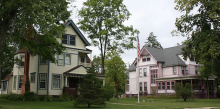Jon Chambers: Rethinking The Rules on The Connect America Fund - Community Broadband Bits Podcast 268

Jon Chambers, a partner at Conexon, returns to visit us this week to talk about rural connectivity and the approaching Connect America Fund (CAF) auction. Conexon works with electric cooperatives to establish high-quality Internet networks for members, typically in rural areas where national providers don’t offer the kinds of services communities need.
Having spent time at the FCC to examine several of their spending programs, Jon Chambers is our go-to guest to discuss next year’s Connect America Fund auction. In this interview, Jon and Chris talk about some of the problems that plague the program and how potential new bidding and award rules will set future deployment standards. Jon gets into where the rules fall short on expanding rural connectivity and offers suggestions for a more consumer driven approach.
For more details on Jon’s thoughts about how to improve the bidding process for the Connect America Fund, check out his article, The Risk of Fraudulent Bidding in the FCC Connect America Fund Auction, on the Conexon blog.
To comment on the FCC proceedings on Competitive Bidding Procedures and Certain Program Requirements for the Connect America Fund Phase II Auction, submit your thoughts at the FCC website under proceeding Docket 17-182 and Docket 10-90.
For more information on rural electric cooperatives and their efforts to bring high-quality connectivity to their members, listen to Jon talk with Christopher for episode 229 of the Community Broadband Bits podcast.
This show is 30 minutes long and can be played on this page or via Apple Podcasts or the tool of your choice using this feed.
Transcript below.
We want your feedback and suggestions for the show-please e-mail us or leave a comment below.
Listen to other episodes here or view all episodes in our index. See other podcasts from the Institute for Local Self-Reliance here.
Thanks to Arne Huseby for the music. The song is Warm Duck Shuffle and is licensed under a Creative Commons Attribution (3.0) license.


